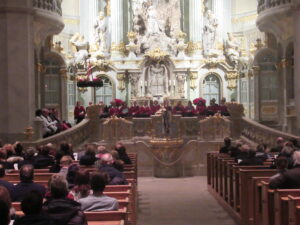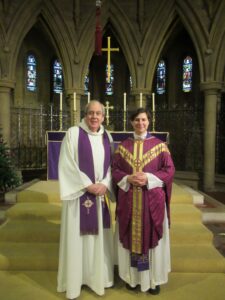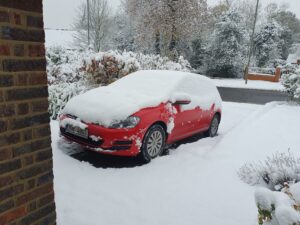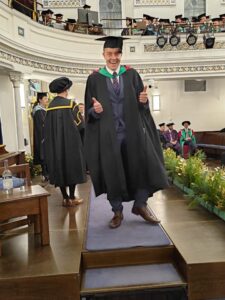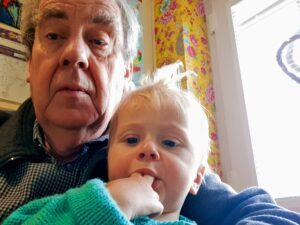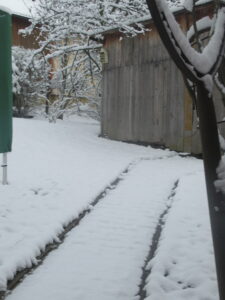
On Friday 2nd December 2022, I discovered that the age of miracles is not quite yet past. Forty-two days on from when I had made my request, there sitting in my mail box was a large envelope containing detailed statements of my now closed Barclays bank account. A week later, I set out as planned and travelled to the UK. Armed with those statements, together with my passport, on the morning of Tuesday 13th December I once more visited the 2 High Street, Nottingham branch of Barclays Bank to set about regaining access to several thousand pounds of my money.
Having explained at the downstairs front desk, what it was I wanted to do, I was told I needed to meet with one of their advisors on the first floor. There were three people ahead of me so I would probably be waiting around thirty minutes. Having waited so long to get to this point, I decided that I could happily cope with waiting a further half-an-hour 😉
In due course I was summons by a male advisor who, though not particularly friendly, was fairly efficient. His main concern was that he wanted to see a more recent second letter I had been sent, as it contained a claims reference number. I assured him that the only letter I had received was the first one dated 10th February 2022, (but not received until mid-March), telling me to close my account or Barclays would do it for me. This is yet another example of the difference between what Barclays say they will do or have done, which bears no relationship to reality 🙁 Fortunately, he eventually, found the required reference number on the internal Barclays computer system.
The advisor then proceeded to make photocopies of my passport and of the first two pages of my recently procured bank statements. These photocopies he then stamped and signed, certifying that he had seen the originals and that they were true copies. In the meantime, I was given two forms to complete and sign. The first was to set out exactly what money I was claiming. The second was to explain where that money was to be sent – in other words, the full details of my new HSBC account.
To his credit, without me needing to ask, he then made a photocopy of everything he would now be submitting to the Barclays office in Leicester later that day, so that I had a complete record, should anything further go wrong. And he confirmed what also appears on the Barclays website, that the money should reach its correct destination within fifteen working days.
After waiting for over fifteen working days, including allowing for the Christmas and New Year public holidays, I discovered that my money was still not in my HSBC account. So on Monday 9th January 2023, I phoned Barclays on the number that appears on their letterhead, and, after dealing with many minutes of robots, spoke to a human being, but, part way through the conversation, I was cut off. I phoned again, listened to various robots before eventually being able to speak to a lady called Melissa.
Melissa, after several different attempts, was eventually, able to access my account. She told me that my completed paperwork had arrived at Barclays Leicester on 15th December 2022. However, on 23rd December 2022, a letter had been sent to me basically saying that I hadn’t proved my address. At this point, I nearly exploded down the phone pointing out that that was exactly what I had done, during my visit to Barclays Nottingham. So Melissa agreed to follow this up and promised me that I would receive a phone call or email in explanation.
I waited for three weeks for the promised phone call or email, or for the letter of 23rd December 2022 to arrive. With receiving no response, on Tuesday 31st January 2023, I phoned Barclays once more. When I finally got past another series of annoying robots, the human being I spoke with could not even access my account. Instead, she wrote an email to the manager of the 2 High Street, Nottingham branch of Barclays, asking him to contact me by phone or email. I waited for a further three and a half weeks and still did not hear or receive anything.
Therefore four weeks ago, on Monday 27th February, I wrote another letter to Barclays Leicester, and sent it by registered post. In it, I explained about my Tuesday 13th December 2022 visit and all that had happened since – more to the point, what had NOT happened since, as outlined in the previous seven paragraphs of this post.
Although I still do not have a copy of their letter of 23rd December 2022, I wrote that I think I have now realised what they believe to be the problem. As I explained earlier, the advisor I saw, certified my most recent printed bank statement for my now closed and frozen Barclays account. This was sent to me by Barclays Leicester on 14th November 2022, arriving at my home on 2nd December 2022, following a letter from me, requesting printed bank statements, dated 17th October 2022. Therefore, at the time of certification by the advisor, it was less than three months old. But the statement is dated 6th September 2022 because that is the date that Barclays unilaterally closed down my account, therefore making it look as though it was more than three months old.
I enclosed a photocopy of their letter dated 14th November 2022 which accompanied my final bank statements. I had this with me when I visited their branch at 2 High Street, Nottingham on 13th December 2022 and I’m pretty sure I showed it to the advisor. He should have also certified that letter. I then stated that, if I am correct in my analysis, and I suspect I am, then the mistake was made by a member of Barclays staff and not by me. I should not be prevented from accessing my money because of a mistake by a member of Barclays staff!
What is more, their own computer records should clearly show the date when that bank statement was sent out. It would surely only take less than a minute to check. But instead, it took eight days before writing a stupid letter which once again, I suspect was never sent. It would only need a little bit of common sense. But sadly, that is what appears to be completely lacking at Barclays Leicester along with common courtesy.
I completed my letter by saying:
I therefore require the following:
-
A phone call or email, as twice previously promised to me but not fulfilled, to confirm that my analysis is correct &/or, an electronic copy of your letter of 23rd December 2022. My home email server is perfectly safe.
-
The transfer forthwith of all of my money to my HSBC account, as requested on 13th December 2022. I have no intention of getting anything else certified as I was assured by a member of your staff that I had done everything necessary. If there was a mistake, it was a mistake by a Barclays staff member, not by me. Barclays are responsible!
-
Compensation for the cost of phone calls, which depending on exchange rates, have put between £20 – £25 on my T-Mobile phone bill.
-
A serious apology for the way this whole matter has been handled – A combination of carelessness and incompetence on the part of Barclays Bank plc.
Nearly four weeks later, on the afternoon of last Saturday, 25th February, an email dropped into my Inbox from ‘Barclays Bank Alerts’, with the subject line: An update to your complaint CRYX28K7KH is now available to view online
Clearly my most recent letter has been received and is now regarded as a complaint with its own complaint reference number. The email goes on to tell me that to access this update, I need to use the Barclays App or Barclays Online Banking.
I have never had the Barclays App and, as I no longer have a valid Barclays account, I cannot get one. However, until my bank account was unilaterally closed by Barclays, I regularly used their Online Banking. To log into online banking, you need a membership number, which I do have. But you then need your debit card and a Pinsentry card reader. My debit card expired on 31st August 2022, the same time as my account was closed. Expired debit cards do not work!
As I wrote, I asked for a phone call or an email. What do I get? An email telling me about a letter hidden online and inaccessible! And no, I cannot reply to the stupid email with advice it is impossible to follow. ‘Replies to this email are not monitored’.
Truth is stranger than fiction, so the saying goes. No! You could not make this up 🙁


